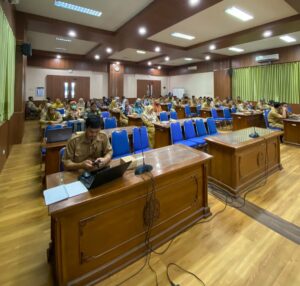Interactive and Dynamic, Public Consultation on Final Draft Regional Long-Term Development Plan for Gunungkidul Regency for 2025-2045
Yogyakarta (12/12) – Research and Innovation Institute (LRI) Universitas Muhammadiyah Yogyakarta through the Center for Public Policy and Digital Government submitted the final draft of the Long Term Regional Development Plan (RPJPD) for Gunungkidul Regency for 2025-2045 at the RR Handayani Regional Secretariat of Gunungkidul Regency. The event was attended by the District Regional Secretary of Gunungkidul Sri Suhartanta, Head of Bappeda Gunungkidul Mohamad Arif Aldian, M.Si., Expert from Universitas Muhammadiyah Yogyakarta University Prof. Dyah Mutiarin, M.Sc., and Slamet Riyadi, PhD.

This public consultation of the RPJPD Gunungkidul for 2025-2045 aims to obtain suggestions and input from stakeholders, various development stakeholders, and the community. It specifically aims to integrate and complete various aspects in the preparation of the RPJPD to reflect comprehensive regional aspirations, needs, and potential.
This event aims to ensure that the RPJPD can support the long-term development vision, and obtain support from various parties, and its implementation can be translated into a derivative document below. In her presentation, Prof. Arin stated, “The preparation of RPJPD documents must refer to the RPJPN. “Then in the RPJPN, there are 45 indicators that must be used as a reference, one of which is a macro indicator described in the RPJPD. It is hoped that it can be implemented into the RPJMD,” she emphasized.
The RPJPD document is still macro and global. It has to be tentative and in line with those owned by the provincial government. Apart from that, the function of the RPJPD design, according to Slamet Riyadi, PhD, has three characteristics: global, flexible, and dynamic. Thus, each indicator criterion must be carefully considered optimally.
Furthermore, the public consultation session jointly initiated by Bappeda Gunungkidul and a team of experts from UMY was interactive and dynamic. Several stakeholders attended the event and provided input including Adjustment of the harmony index from the Ministry of Home Affairs; Accelerated movement, collaboration, and synergy of development; adjustments to the two principles between the Ministry of Home Affairs (planning) and the Ministry of Administrative and Bureaucratic Reform (Evaluation), and the demographic bonus. This event also emphasized three pillars of transformation, including civil servant governance as an engine of development, which includes the merit system readiness to face the VUCA era.